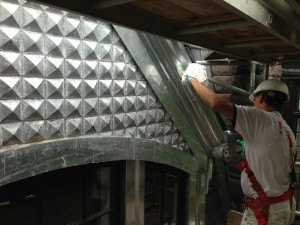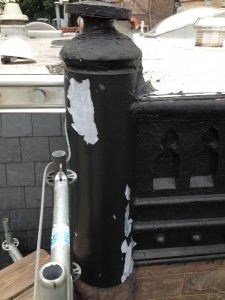We are currently working on the historical restoration of the façade of one of the three adjacent brown stone houses Potter Palmer had built for his three daughters in the late nineteenth century on Chicago’s Gold Coast area. The project involved the complete rebuilding of the metal 2-story bay window, cornice and slate roof elements. All the metal surfaces were faithfully recreated using galvanized steel, which we needed to paint in a high-gloss black.
The manufacturing process for galvanized steel leaves the surface of the steel coated with a thin oily film. It is essential to remove that oily substance before any primer or coating can be applied. To do the job properly, we used lacquer thinner, scrub pads and rags to clean the metal surfaces. Using a scrub pad really helps to loosen the oily film and rags finish up the job.
Not properly cleaning the new galvanized steel in this way will result in the premature failure of any coating put on the steel. A good example of this is the corner turret on the next-door neighbor’s house, as shown in the picture. As you can see, the coating has simply not adhered to the steel and is massively failing. Our client instructed us to strip and refinish her neighbor’s turret on her own dime, as a courtesy for her neighbor putting up with the scaffolding for three months, while her façade restoration was taking place.
Another important step in properly finishing galvanized steel is to use a bonding primer specially designed to adhere well to that metal. No oil-based primers should be used – only waterborne bonding primers. The paint we selected for the project was an industrial High Performance Acrylic designed for challenging environments like this.
As house painting contractors in the Chicago area for almost twenty-five years, we have long learned that surface preparation is key to a successful paint job.









 Follow
Follow
